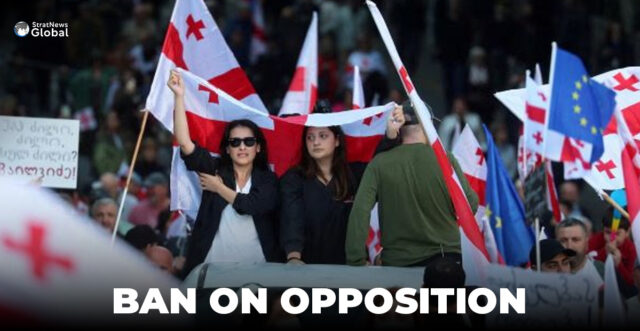Georgia’s ruling party announced on Tuesday that it will petition the Constitutional Court to outlaw the country’s three largest opposition parties, according to the speaker of parliament.
The decision marks a dramatic escalation in Georgia’s growing authoritarian turn and poses a serious challenge to its standing as a candidate for European Union membership.
Shalva Papuashvili, a senior member of the ruling Georgian Dream party, said the lawsuit would aim to outlaw three parties – the Coalition for Change, ex-President Mikheil Saakashvili’s United National Movement, and the Strong Georgia bloc.
The three parties, which are all strongly pro-Western, pose “a real threat to the constitutional order”, Georgia’s Interpress news agency quoted him as saying.
Irakli Kupradze, a senior member of Strong Georgia, was cited by local media as calling the lawsuit “a decisive blow to democracy” and vowing resistance.
Several Opposition Figures Are In Jail
Once among the most democratic and pro-Western of the successor states to emerge from the Soviet Union, Georgia has turned increasingly authoritarian since the outbreak of war in Ukraine and has deepened economic ties with neighbouring Russia.
Several senior Georgian opposition figures are in jail, while police have ramped up arrests of protesters attending regular anti-government demonstrations that have continued for over a year.
Earlier this year, parliament passed a law making it easier to ban political parties.
Georgian Dream has frozen talks on Georgia’s accession to the European Union and has accused the bloc of plotting revolution in Tbilisi.
The EU denies the accusations, and Georgian Dream says it still wants to join the bloc, but only if it can preserve what it says are Georgia’s traditional Orthodox Christian values as well as peaceful ties with Russia.
Georgian Dream figures, including Bidzina Ivanishvili, the billionaire ex-prime minister widely seen as the country’s de facto ruler, have repeatedly vowed to ban the opposition parties for what they say are their links to Saakashvili, the jailed former president.
The party’s lawsuit is based on the findings of a parliamentary commission investigating alleged wrongdoing under Saakashvili, which opposition figures describe as propaganda.
Two of the opposition parties facing a ban have been critical of Saakashvili, who led Georgia as a pro-Western reformer from 2003 to 2012.
He remains a divisive figure in Georgia, where some celebrate his achievements in office, while others accuse him of being erratic, authoritarian, and the author of a disastrous 2008 war with Russia.
Saakashvili is serving a prison term for offences including abuse of power, and is expected to remain in jail until 2034.
(With inputs from Reuters)





